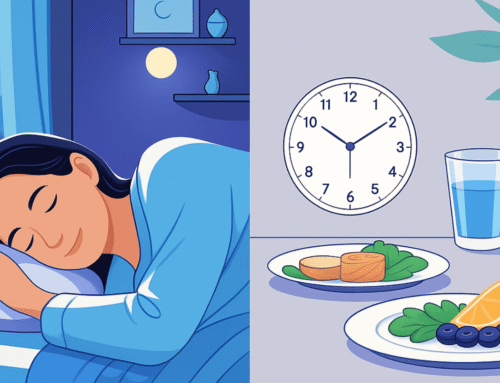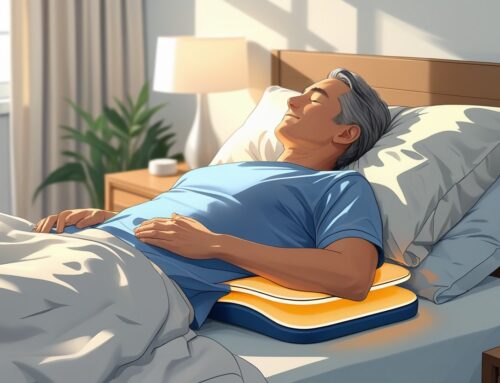Sleep has a direct connection to cholesterol and heart health. When someone doesn’t get enough rest or their sleep is low quality, it changes how the body works. Bad cholesterol (LDL) can go up while good cholesterol (HDL) goes down. This imbalance puts more stress on the heart and raises the risk of serious health issues. When sleep is disrupted, the body’s natural rhythms are thrown off. This affects how cholesterol is broken down and cleared. Over time, these changes can push cholesterol levels higher and may even harm the liver. Knowing how sleep links to cholesterol shows why better rest is key for keeping the heart healthy.
Improving sleep is a practical way to support cholesterol management. Small changes in habits can lower health risks without depending only on medication. Good rest becomes another tool for keeping the body balanced and protecting long-term health.
Key Takeaways
- Too little or poor-quality sleep can raise LDL and lower HDL.
- Disrupted sleep changes how the body handles cholesterol.\
- Better sleep helps protect the heart and maintain healthy cholesterol levels.
- The right mattress supports deeper and cooler sleep that helps balance stress and cholesterol levels.
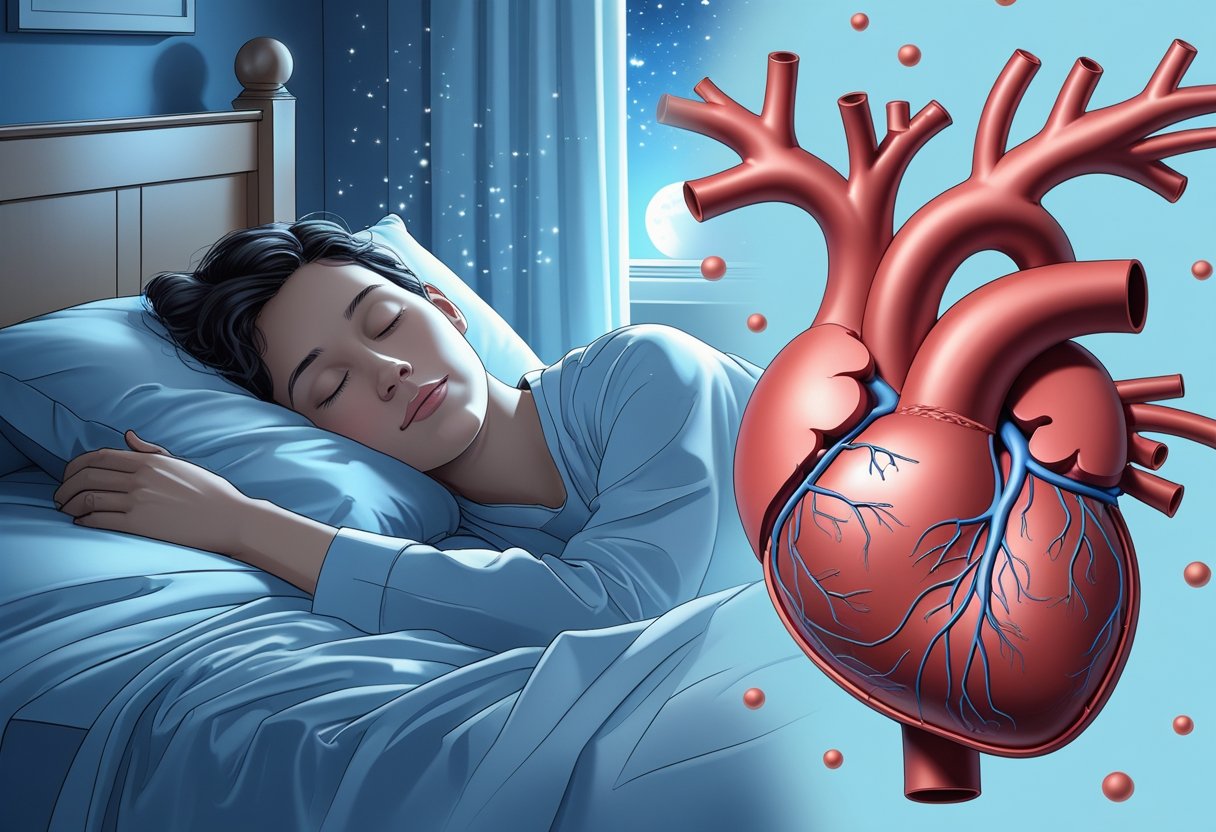
How Sleep Affects Cholesterol Levels

Sleep influences the way the body handles cholesterol through several biological processes. It changes how cholesterol is made, broken down, and carried in the blood. Hormones that work while we sleep also affect these levels. The amount of rest someone gets can shift the balance between good cholesterol (HDL) and bad cholesterol (LDL).
Cholesterol Metabolism During Sleep
The liver is responsible for most of the body’s cholesterol. At night, it increases production as part of the body’s natural daily rhythm. When sleep is interrupted, this rhythm gets thrown off, which can lead to higher cholesterol levels. Sleep also influences enzymes like CYP7A1. This enzyme helps turn cholesterol into bile acids so the body can remove it. If the enzyme slows down, cholesterol builds up in the liver and blood. Studies show that poor sleep can reduce CYP7A1 activity, raising the risk of both liver and heart issues.
Hormonal Changes and Cholesterol
Hormones tied to sleep have a strong effect on cholesterol balance. Cortisol, which is linked to stress, usually drops at night. If sleep quality is low, cortisol rises instead. High cortisol raises LDL and lowers HDL, which isn’t good for heart health.
Sleep also affects leptin and ghrelin, the hormones that control hunger and energy use. Too little sleep lowers leptin, which slows fat burning, and raises ghrelin, which increases appetite. This mix can lead to weight gain and higher cholesterol. Getting enough rest keeps these hormones steady and supports healthier cholesterol levels.
Impact of Sleep Duration on Lipid Profiles
Both very short and very long sleep are linked to unhealthy cholesterol levels. People who get fewer than 6 hours or more than 9 hours of sleep often have higher LDL and triglycerides, along with lower HDL.
Short sleep interrupts the way the body handles fatty acids and cholesterol, raising the risk of heart disease. Longer sleep may also affect metabolism, though the reasons aren’t fully clear. The best balance appears to be around 7 to 8 hours of good-quality rest, which is tied to healthier cholesterol levels and lower risk for heart problems. You can find more details on the connection between sleep and cholesterol.
Lack of Sleep and High Cholesterol Risks
Sleep has a major role in how the body manages cholesterol and fats. When someone doesn’t get enough rest, hormone levels shift and metabolism slows down. Over time, this can raise the risk of high cholesterol and unhealthy fat levels in the blood.
Role of Sleep Deprivation in Cholesterol Imbalance
Not sleeping enough can push stress hormones like cortisol higher. Cortisol affects how the body produces cholesterol, and when it stays high, total cholesterol and LDL (“bad” cholesterol) can rise. Poor sleep also reduces the body’s ability to break down fats the way it should.
The liver is a key player in handling cholesterol, and sleep loss interrupts how it works. Without proper rest, the liver struggles to keep cholesterol in balance and remove fats from the bloodstream. This steady disruption links poor sleep to higher cholesterol and greater chances of heart disease.
Short Sleep Duration and Increased LDL
People who get less than six hours of sleep at night often show higher LDL cholesterol. LDL is labeled “bad” because it sticks to artery walls and can block blood flow, leading to heart problems. Studies show that shorter sleep is connected to more LDL particles in the blood. One reason is hormonal shifts. When sleep is cut short, cortisol levels rise, and insulin resistance increases. These changes make it harder for the body to control cholesterol properly, leaving LDL levels unchecked. Regular short sleep is, therefore, a direct risk factor for unhealthy cholesterol.
Insufficient Sleep and Triglycerides
Triglycerides are another type of fat in the blood tied to heart risk. A lack of sleep pushes triglyceride levels higher because it slows fat metabolism and can encourage weight gain. When sleep quality is poor, the body doesn’t clear triglycerides as it should, leaving more in circulation. Research shows that people with bad sleep patterns usually have higher triglycerides, sometimes along with increased LDL and total cholesterol. This mix creates a stronger risk of cardiovascular disease. Getting consistent and quality rest is one way to help keep these blood fats under control.

The Influence of Sleep Quality on Cholesterol
When sleep is broken or shallow, it can change the way the body handles fats. This happens because poor sleep disrupts metabolism and throws off hormone balance. Over time, this can lead to changes in cholesterol that raise the risk of heart problems.
Interrupted Sleep and Lipid Levels
Interrupted sleep means waking up many times through the night or tossing around without rest. When the body doesn’t reach deep sleep, it loses the recovery needed to stay healthy.
Research shows that people who sleep this way usually have higher total cholesterol and more LDL, the type of cholesterol linked to clogged arteries. Broken sleep interferes with the body’s rhythm and signals the liver to produce more cholesterol than needed. This creates an unhealthy blood fat profile that makes heart disease more likely. Even small sleep disruptions, when they happen again and again, can raise triglycerides and bring down HDL, the cholesterol that protects the heart. Continuous, peaceful sleep is key for keeping blood lipids balanced.
Sleep Apnea and Cholesterol
Sleep apnea is a condition where breathing stops many times during sleep. Each pause lowers oxygen and wakes the person up briefly, even if they don’t notice it. This constant cycle has a direct effect on cholesterol.
People with sleep apnea usually show higher LDL, triglycerides, and total cholesterol, along with lower HDL. The repeated lack of oxygen stresses the body, sparks inflammation, and changes how fats are processed. Studies confirm that sleep apnea harms cholesterol levels even when no other health issues are present. Using treatment like CPAP, which keeps airways open, can improve cholesterol by reducing these breathing pauses and restoring oxygen flow.
Hormone Imbalances from Poor Sleep
Hormones influence how the body manages cholesterol, and quality sleep keeps them in balance. When sleep is cut short or disturbed, hormones like cortisol, insulin, and growth hormone are affected. High cortisol from stress and lack of sleep tells the liver to produce more cholesterol. Poor sleep also contributes to insulin resistance, which raises triglycerides and lowers protective HDL. At the same time, too little growth hormone from disrupted sleep limits the body’s ability to break down fat.
Together, these shifts in hormones make cholesterol levels worse and raise the chance of long-term metabolic issues. Improving sleep helps reset these hormones and supports healthier cholesterol control.

High Cholesterol and Its Effect on Sleep
High cholesterol can influence sleep quality in various ways. It does not directly cause sleep problems, but it is linked to health issues that interfere with rest. People with high cholesterol may feel more tired or struggle with disrupted sleep because of the way cholesterol affects the heart and blood vessels.
Can Cholesterol Cause Sleep Problems
High cholesterol by itself does not directly cause sleep disorders. But it is a major risk factor for conditions like heart disease and blocked arteries. These problems can lead to discomfort, chest pain, or a racing heartbeat, all of which make it harder to fall asleep or stay asleep.
Obstructive sleep apnea is also more common in people with high cholesterol. This condition causes breathing to stop for short periods during sleep, breaking the natural rhythm of rest. Cholesterol can affect circulation as well, which may indirectly lead to more sleep problems over time.
The Link Between High Cholesterol and Tiredness
High cholesterol can sometimes make people feel more tired. This is often related to poor circulation or the early stages of heart issues caused by cholesterol buildup in the arteries. When blood flow is limited, the body and muscles may not get enough oxygen, leading to fatigue. Conditions that go hand-in-hand with high cholesterol, like obesity or metabolic syndrome, can also drain energy. These health problems add to the tiredness, making it harder for the body to recover fully. So while cholesterol itself may not directly cause sleepiness, the problems it triggers can.
High Cholesterol and Insomnia
High cholesterol may not be the direct reason for insomnia, but it plays a role through related health complications. Heart problems or breathing issues linked to cholesterol can cause discomfort at night, leading to restlessness or waking up multiple times. Poor sleep caused by these health struggles can raise stress hormone levels. In turn, this can make insomnia worse and create a cycle of stress and sleeplessness. Keeping cholesterol in check can lower these risks and support more consistent, restful sleep.
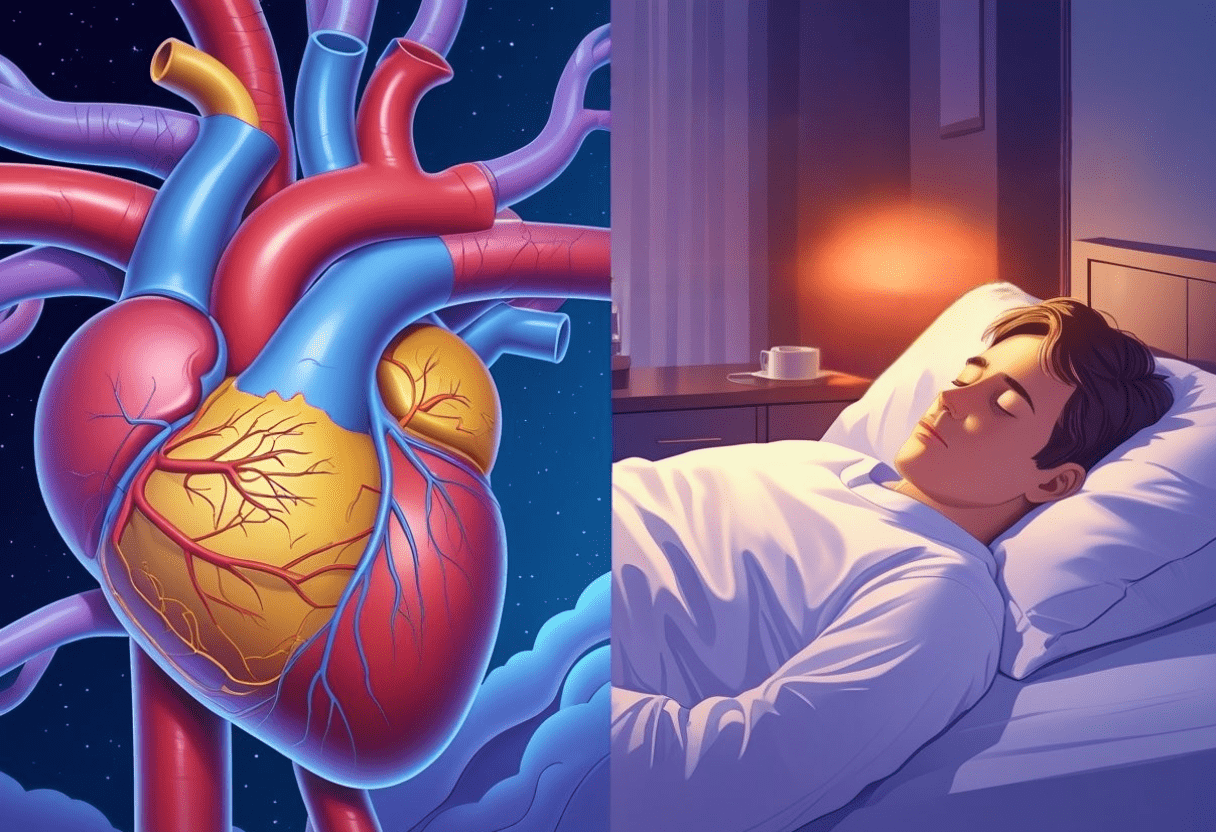
Differences by Age and Gender
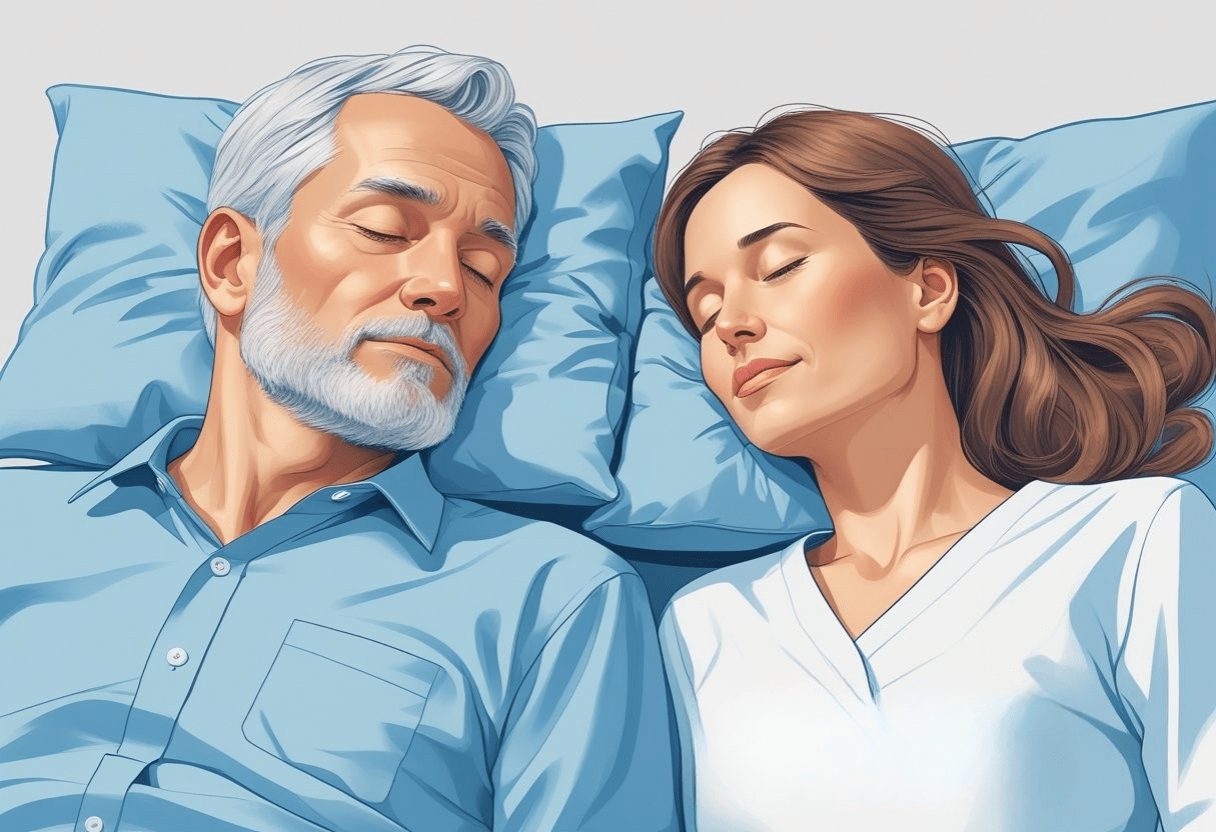
Sleep’s impact on cholesterol varies notably between men and women and changes with age. These differences are linked to biological factors and lifestyle habits, affecting how sleep duration relates to cholesterol levels.
Sleep, Cholesterol, and Gender Differences
Sleep affects men and women in different ways when it comes to cholesterol. For women, getting five hours or less is linked with a higher chance of high cholesterol. Compared to seven hours of sleep, this short amount increases the risk by about 27%. For men, the pattern is different. Sleeping eight hours or more is linked with lower cholesterol levels, with about a 20% lower risk compared to seven hours.
These results suggest that men and women don’t respond to sleep the same way. Hormones and metabolism are two possible reasons for this difference. Research continues to show that sleep habits interact with gender when it comes to cholesterol, which means both need to be looked at together.
Age-Related Variations in Lipid Response to Sleep
Age also changes the connection between sleep and cholesterol. In people under 60, the impact is clearer: women are more likely to face higher cholesterol with short sleep, while men may gain protective effects from longer sleep. In older adults, these patterns are not as strong or consistent.
One reason could be how age affects the body’s ability to manage lipids. Younger people have a more active metabolism, which may explain why sleep changes show up more in cholesterol numbers. This means sleep’s effect on cholesterol is not the same at every stage of life and should be considered along with age.
Practical Strategies for Better Sleep and Cholesterol Health

Good sleep and healthy cholesterol levels are linked. Building steady routines, eating well, and managing stress all play a part. When these steps work together, they support heart health and reduce the risks tied to poor rest and high cholesterol.
Building Healthy Sleep Habits
A regular sleep schedule keeps the body’s clock on track, which influences how cholesterol is processed. Going to bed and waking up at the same time every day, even on weekends, keeps hormone cycles steady and supports better lipid control. The bedroom should be quiet, dark, and cool—around 65 to 68°F works best. Cutting out caffeine after the afternoon and turning off screens an hour before bed helps prevent interruptions in sleep.
Simple nightly routines can also prepare the body to rest. Reading a book, stretching lightly, or breathing exercises signal it’s time to slow down. Getting longer stretches of deep sleep supports hormone balance, which in turn helps regulate cholesterol.
Lifestyle Changes to Improve Lipid Profiles
Food and activity shape cholesterol levels as much as sleep does. A Mediterranean-style diet that includes fruits, vegetables, whole grains, and healthy fats supports lower LDL and higher HDL cholesterol. Aerobic exercise helps the heart by boosting good cholesterol and lowering triglycerides. Morning or afternoon workouts also improve sleep later at night. But exercising too close to bedtime can make it harder to fall asleep.
Stress is another key factor. High stress raises cortisol, which may push LDL cholesterol higher. Using techniques like meditation or slow breathing reduces stress levels, helping both cholesterol and sleep.
Integrating Sleep Improvement with Cholesterol Management
Keeping track of progress can show how better sleep impacts cholesterol. Blood tests before and after sleep changes provide proof of improvement and help guide future steps. Addressing conditions like insomnia or sleep apnea is also important. These issues can raise cholesterol risk, so professional treatment can improve both sleep and heart health.
Working on sleep, diet, and exercise at the same time is more effective than focusing on one area alone. Together, they build a stronger defense against cholesterol problems and lower the chances of heart disease.
How Mattress Comfort Supports Sleep and Healthy Cholesterol
A mattress that provides the right support and comfort can improve sleep quality. Better sleep helps the body regulate hormones that affect cholesterol levels. When sleep is good, the body produces less stress hormone cortisol, which can help keep cholesterol balanced.
A firm or medium-firm mattress usually supports the spine well. This support reduces tossing and turning, allowing for longer, uninterrupted sleep. Restful sleep helps the body lower bad LDL cholesterol and raise good HDL cholesterol. Temperature regulation is also key. Mattresses that help keep the body cool prevent overheating and night sweats, which can break up sleep. Consistent deep sleep supports the repair of cells and tissues and helps manage cholesterol effectively.
Benefits of a good mattress on sleep and cholesterol:
- Supports proper spinal alignment
- Reduces sleep interruptions
- Promotes balanced hormone levels
- Helps maintain healthy cholesterol levels
Choosing a mattress that combines support, comfort, and temperature control can lead to better sleep. Improved rest can then support healthier cholesterol, reducing risks of heart disease and related conditions. One option to consider is the Layla Hybrid Mattress, which features a flippable design with both soft and firm sides, along with cooling technology that helps maintain comfort through the night. This balance of flexibility, support, and breathability makes it a strong choice for anyone aiming to improve both sleep quality and overall health.

Frequently Asked Questions
Sleep is essential in cholesterol and overall heart health. Both the number of hours you sleep and how restful that sleep is can affect cholesterol levels. Changes in hormones, stress, and other health factors tied to sleep also shape how the body manages cholesterol.


